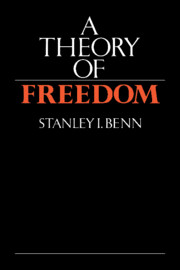Book contents
- Frontmatter
- Contents
- Foreword
- Preface
- Acknowledgments
- 1 Persons and values
- 2 Practical rationality and commitment
- 3 Reasons in conflict: Quandaries and consistency
- 4 Values and objectivity
- 5 Natural personality and moral personality
- 6 The principle of respect for persons
- 7 Freedom of action
- 8 Freedom as autarchy
- 9 Autonomy and positive freedom
- 10 Autonomy, integration, and self-development
- 11 Self-realization, instinctual freedom, and autonomy
- 12 Autonomy, association, and community
- 13 Human rights and moral responsibility
- 14 The principle of privacy
- 15 Interests in privacy
- 16 Conclusion: A semantic theory of freedom
- Notes
- Index
15 - Interests in privacy
Published online by Cambridge University Press: 04 December 2009
- Frontmatter
- Contents
- Foreword
- Preface
- Acknowledgments
- 1 Persons and values
- 2 Practical rationality and commitment
- 3 Reasons in conflict: Quandaries and consistency
- 4 Values and objectivity
- 5 Natural personality and moral personality
- 6 The principle of respect for persons
- 7 Freedom of action
- 8 Freedom as autarchy
- 9 Autonomy and positive freedom
- 10 Autonomy, integration, and self-development
- 11 Self-realization, instinctual freedom, and autonomy
- 12 Autonomy, association, and community
- 13 Human rights and moral responsibility
- 14 The principle of privacy
- 15 Interests in privacy
- 16 Conclusion: A semantic theory of freedom
- Notes
- Index
Summary
Private affairs
To claim immunity on the ground that an inquiry is an intrusion into one's private affairs is to make an argumentative move of quite a different kind from an appeal to the general principle of privacy. For the concept of private affairs entrenches the privacy of certain special areas far more strongly than the mere presumptive immunity of the general principle. To justify an intrusion into these areas, one must have not merely a reason, but one strong enough to override special reasons for not intruding. So while the interests of phonetic science might justify Professor Higgins's impertinence in Covent Garden, they would not be good enough reasons for bugging Eliza's bedroom.
One's private affairs relate not to the principle of privacy but to the interests that people have in privacy. The activities and experiences commonly thought to fall within the special area of private affairs are diverse and in some cases at least culture dependent. Some seem to have no rational ground at all for being private. Why should the bodily functions which in our culture are appropriately performed in solitude include defecation but not eating? Of course, so long as some acts are assigned to this category anyone who has internalized the social norms will be painfully embarrassed if seen doing them. Embarrassment is indeed the culturally appropriate response in a society with the concept of pudenda; anyone not displaying it may be censured as brazen or insensitive.
- Type
- Chapter
- Information
- A Theory of Freedom , pp. 281 - 305Publisher: Cambridge University PressPrint publication year: 1988



